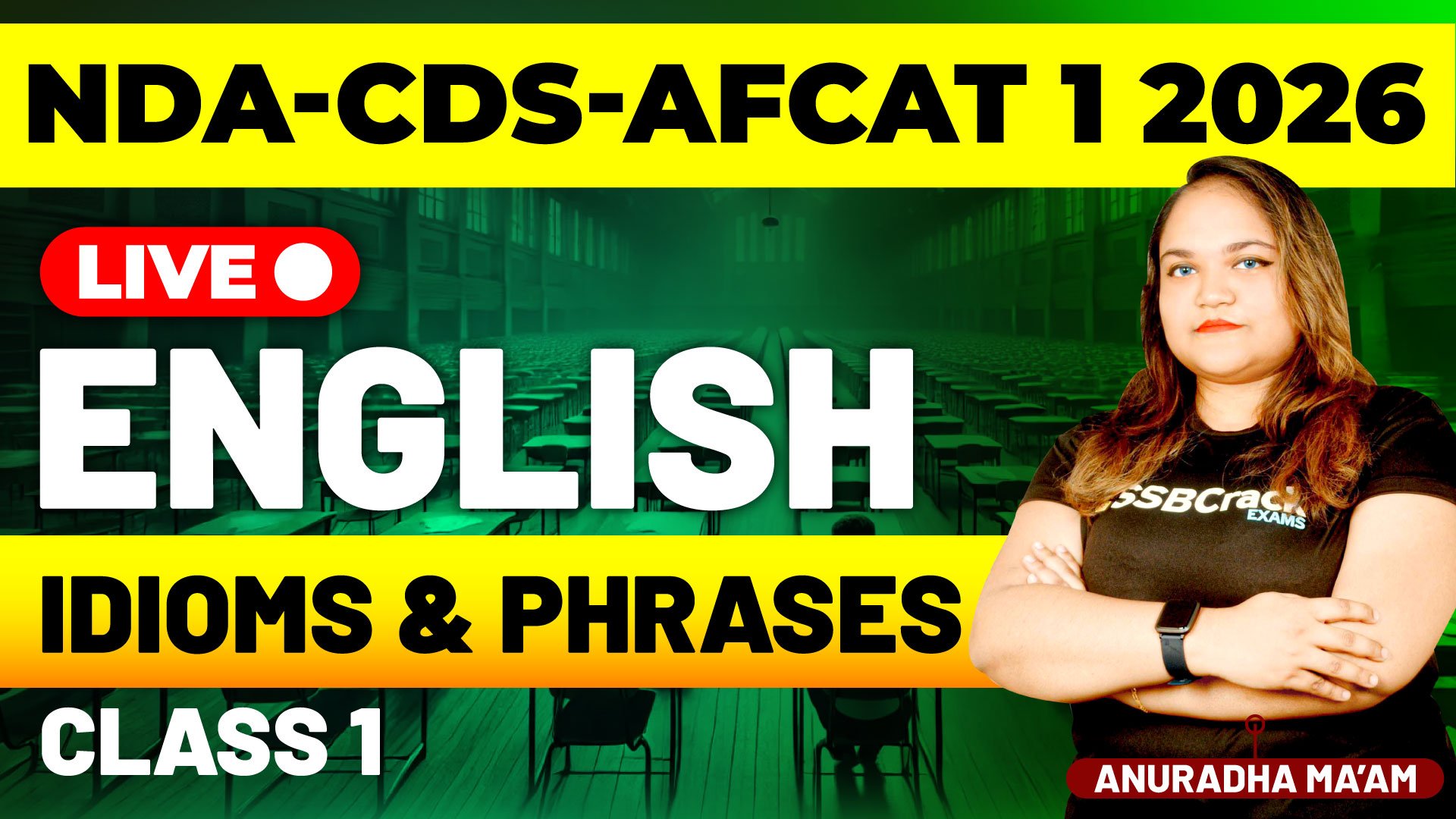The English Live Class 1 on Idioms & Phrases for NDA, CDS & AFCAT 1 2026 marked the beginning of an exciting and highly practical vocabulary journey. Idioms and phrases are among the most interesting yet scoring topics in the English section of Defence exams. This live session focused on building conceptual clarity, contextual understanding, and exam-level practice through a series of well-selected MCQs.
Idioms & Phrases reflect how naturally and fluently a candidate understands English expressions — a vital skill not only for the written exam but also for communication during SSB interviews and daily military correspondence.
Importance of Idioms & Phrases in Defence Exams
- High-Scoring Section:
Almost every NDA, CDS, and AFCAT paper includes 3–5 questions from Idioms & Phrases. Once understood, these questions can be solved in seconds. - Tests Contextual Understanding:
Idioms aren’t literal; they test how well you grasp figurative language and contextual meaning, which is key in comprehension and expression. - Reflects Command over English:
Knowing idiomatic usage enhances spoken and written fluency, showing your ability to think and communicate like an effective leader. - Supports Other Topics:
Idiomatic understanding also aids Cloze Tests, Sentence Completion, and Comprehension passages, where such phrases often appear indirectly. - Essential for SSB & Communication:
Officers are expected to speak with clarity and confidence. A good command of idioms reflects clarity of thought and natural expression — key Officer-Like Qualities (OLQs).
MCQs Covered During the Class
This class included a blend of previous year’s exam questions and concept-based idiomatic expressions, ensuring students understand both meaning and practical usage.
Here are some of the MCQs discussed during the session:
- To turn a deaf ear – (a) To ignore (b) To listen carefully (c) To misunderstand (d) To pay attention
✅ Correct Answer: To ignore - At sixes and sevens – (a) In harmony (b) In confusion (c) At ease (d) In danger
✅ Correct Answer: In confusion - Hit the nail on the head – (a) To make a mistake (b) To say exactly the right thing (c) To injure someone (d) To argue
✅ Correct Answer: To say exactly the right thing - A blessing in disguise – (a) Something that looks bad but turns out good (b) A curse (c) A miracle (d) A mystery
✅ Correct Answer: Something that looks bad but turns out good - Throw light on – (a) To highlight (b) To confuse (c) To make fun of (d) To ignore
✅ Correct Answer: To highlight - Make both ends meet – (a) To live within one’s income (b) To become rich (c) To meet everyone (d) To fulfill dreams
✅ Correct Answer: To live within one’s income - Call a spade a spade – (a) To be honest and straightforward (b) To avoid criticism (c) To speak politely (d) To exaggerate
✅ Correct Answer: To be honest and straightforward
Each idiom was explained with examples, contextual meaning, origin (where relevant), and sentence use, ensuring deeper understanding instead of surface-level memorization.
Class Highlights
- MCQ Practice: Covered exam-type questions from NDA, CDS, and AFCAT papers.
- Contextual Application: Focused on how idioms appear in real exam sentences.
- Learning through Usage: Emphasis on making idioms part of daily vocabulary.
- Interactive Quizzing: Rapid recall rounds and fun phrase-matching exercises for retention.
Learning Techniques Shared in Class
- Visual Memory:
Associate idioms with vivid images or situations to remember them easily.- Example: To spill the beans — imagine beans spilling from a pot = revealing a secret.
- Thematic Grouping:
Study idioms based on themes like emotions, work, success, failure, honesty, etc. - Sentence-Based Learning:
Always learn idioms with example sentences. Example: He turned a deaf ear to my advice. - Daily Revision Habit:
Revise 5–10 idioms daily using flashcards or short quizzes to ensure long-term recall. - Context Practice:
Write your own short paragraphs using idioms to build confidence in usage.
Exam Perspective
In NDA & CDS, idioms and phrases are mostly direct MCQs where aspirants must identify the correct meaning.
In AFCAT, idioms may appear within sentence completion or comprehension contexts, requiring understanding of tone and usage.
With consistent practice, students can achieve 100% accuracy in this section — turning it into a sure-shot scoring area in the English paper.
Key Takeaways from Class
- Memorize idioms through context, not isolation.
- Keep a personal idiom diary with meanings and usage examples.
- Revise and reuse idioms in writing and speaking to internalize them.
- Practice previous year questions to identify recurring idioms.
- Treat idioms as fun language expressions, not as difficult terms to memorize.
Conclusion
The English Live Class 1 on Idioms & Phrases offered aspirants a perfect balance of learning and application — strengthening both vocabulary and expression. Through focused MCQ practice, contextual examples, and fun memory techniques, candidates gained clarity and confidence in one of the most rewarding sections of the Defence English syllabus.
Idioms & Phrases don’t just help you score well — they help you think, speak, and write like a future officer. By understanding their meaning and using them naturally, aspirants can sharpen their communication skills, enrich their personality, and stand out in all stages of NDA, CDS, and AFCAT preparation.
So keep practicing, keep revising, and soon you’ll find yourself using these expressions effortlessly — both in your exams and your everyday conversations.







